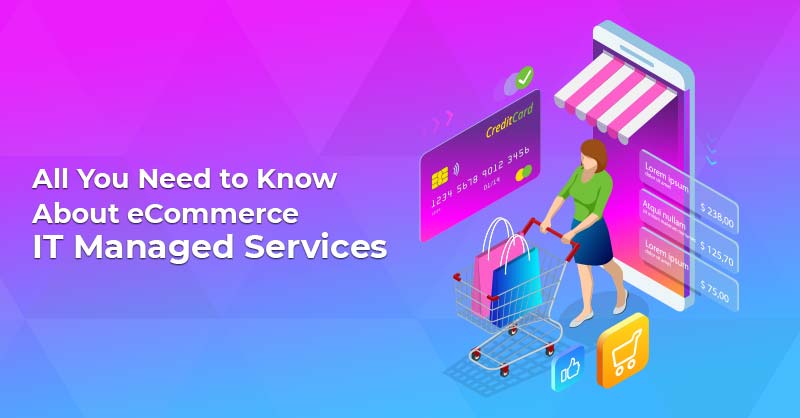All You Need to Know About eCommerce IT Managed Services

Written by Poonam Chandersy
Technical Content Writer
October 3, 2022
According to a report, the global IT Managed Services market is expected to grow at a Compound Annual Growth Rate (CAGR) of 7.9%, from USD 242.9 billion in 2021 to USD 354.8 billion in 2026.
Digital Commerce and its convenience have become a necessity due to prevailing circumstances; it is no longer sufficient to have just a digital presence for a retail business. eCommerce businesses must deliver a seamless, secure, and consistent experience across every touchpoint during the customer journey. In this blog, we will highlight the current state of eCommerce Managed Services, the prevailing challenges, their solutions, and opportunities, along with how these services can empower eCommerce businesses to pursue mission-critical goals.
While online businesses can hire an IT Managed Service Provider, eCommerce platforms have the option of going with either an internal or external IT support team. The teams for these services can offer 24×7 Monitoring & Maintenance Support.
Most teams follow the ITIL Service Management model, the overarching objective of which is to help online businesses with:
Incident Management
Service Request Fulfilment
Problem Management
Access Management
The growing complexity is an essential part of technological evolution, and it is imperative to reduce it whenever possible. However, several problems arise when the dependency is solely on in-house IT teams. An external eCommerce IT Managed Services Provider (MSP) has proven to help achieve enhanced results.
The MSP Advantage
eCommerce IT Managed Services are facing a consistent and constant evolution. This evolution has enabled MSPs to empower businesses with unified support services for infrastructure and applications, which includes 24×7 uptime, improved service consistency, and predictability. An MSP offers proactive and preventive monitoring at the infra and application level for quick issue and query resolution via dedicated teams. This enables them to be vigilant to minimize the impact of unplanned system outages.
Below are some of the modern eCommerce MSP offerings:
- Cross eCommerce platform support Hybris, SAP CCv1, CCv2, HCL Commerce, Magento etc.
- Kubernetes & Docker Swarm
- IT Infrastructure & operation Support (Traditional & Cloud)
- Application Post Production Support
- Order Management System
- HAC & Back office
- Groovy Script & Cron Jobs
- Devops (Jenkins)
- Solr Indexing
- CMS Solutions
- End-To-End Marketplace Operations Management
- Enterprise Level Development & Integration Support
- Content Management System (CMS), Catalogue & Campaign Management
- Users & Promotions Management
- Cart & Checkout Processes
- Order, Reconciliation & Fulfilment Management
- Payment & Distribution Management
- Accounting & Reconciliation Automation
- Product Packaging & Shipping Management
- Customer Support & Returns Management
In-House IT Support Staff vs. MSPs
When an eCommerce business has limited IT-support staff, they are limited in the scope of the skills. However, the reality is that the IT world is complex and vast, and the employees may not have the required expertise to handle complex issues.
There cost of having experienced professionals on staff is also associated. Onboarding someone with extensive skills will increase the operating costs. Sometimes, the cost of hiring resources or outsourcing IT support to a vendor can be higher than an MSP. Also, in-house support staff only work during business hours. In contrast, MSPs can provide round-the-clock 24×7 support.
Lack of Innovation
There is a lack of innovation in IT Managed Services. One of the main reasons for slow change is cultural inertia. Organizations tend to stick to their preferred way of doing things, and it becomes a part of their DNA, which is hard to overcome and prevents the organization from evolving.
To solve this problem, creativity and an approach to trying new things must be encouraged. MSPs must embrace cutting-edge techniques such as DevOps and Site Reliability Engineering. They bring a continuous improvement approach to management and operations, ensuring reliability and quality are measurable, seamless, and customer-centric.
The Data-Driven MSP
Data-driven providers combine data, analysis, and insights to quickly enable real-time decision-making at scale – since what can’t be measured can’t be controlled.
Below are the strategies modern MSPs adopt to build a strong foundation:
- Build a Data Governance Strategy – Base the technological and service evolution strategy on insights collected from analyzing the performance metrics. Without a defined mechanism to measure the results, no plans, strategies, or decisions should be made.
- Enable Data Democratization – MSPs with a data-driven culture have broad access to clean, high-quality data from a single integrated source of truth. This must extend to the tools used to analyze the data.
Scale Efficiently with Cost-Effective Microservices
Microservices are deployed and organized independently around business capabilities. They are built to enable rapid, continuous, and reliable delivery of complex applications at an enterprise scale. As a result, they are the most efficient and cutting-edge paradigm for eCommerce MSPs. Concepts such as Composable Commerce continue to democratize microservices, enabling businesses to shift to this evolutionary, infrastructural, and architectural paradigm.
Quicker & Seamless Remote Processes
The solution to not having in-person resources available is Remote Infrastructure Management (RIM). It includes the process of managing the IT infrastructure of an enterprise from a remote location. RIM includes IT hardware, software, network, storage, security, and servers. It also aids enterprises in significantly reducing IT costs while providing operational flexibility.
Below are RIM’s benefits:
- 24x7x365 Support: IT infrastructure is prone to malfunctions. RIM enables MSPs to offer 24×7 incident resolution assistance
- Customizability: RIM offers high levels of customized services that meet the business needs and requirements of MSPs
- Enhanced Uptime: RIM empowers an MSP with highly skilled technicians, experts, and troubleshooters who can fix issues fast to maintain uptime
MSP Security
As an IT Managed Service Provider, security needs to be at the forefront. Therefore, a security assessment is mandatory to gauge the cyber security risks. Additionally, as vulnerabilities hide in legacy systems that are infrequently updated, MSPs must be alert, as failure can result in data breaches.
The nature of security software makes it difficult to mandate a single means of improving the security of an MSP. However, transitioning to the cloud can be quite effective. The responsibility of security becomes a shared responsibility, with some parts becoming the cloud service provider’s responsibility.
Cyber security specialists at MSPs stay up-to-date with the latest defenses and can resolve incidents quickly. While cybersecurity is technically outside the MSP domain, they are expanding to include it in their offerings.
The Future of eCommerce IT Managed Services
Automation and RPA Bots
Automation is thriving across the MSP space because of its unmatched advantages. It enables providers with the following essential abilities:
- Service Level Agreement Compliance: MSPs must deliver the SLAs within a defined time. Automation helps with auto-assignments and auto-routing of the tickets. Support tickets are routed, so the issues are resolved quickly. Automating IT processes after an alert about outages or network issues also helps towards a quicker resolution.
- Reducing Operating Costs: APM-powered automation helps to enable driverless processes without human intervention, saving cost and time. It reduces human errors and the need for resources. As a result, experts can focus on critical tasks rather than repetitive and mundane tasks. Many L1-level tasks include query handling, service request management, and incident logging that can be automated using AI-powered bots.
- Saving Time: Time is essential when it comes to scaling a business. Automating mundane IT tasks help MSPs save time so experts can focus on critical tasks such as planning and analysis.
- Retaining Customers: Customer experience is essential in retaining customers. MSPs can leverage automation to enable support services for customers. For example, businesses can quickly use AI-powered bots to understand IT language and resolve issues without human intervention.
As per ticket severity level response & resolution time mentioned.
More NLP/ ML in Chatbots
MSPs always seek to enhance their productivity and efficiency to increase profits and customer satisfaction. But, at the same time, MSPs want to maintain quality and reduce costs. For this, they need to stay competitive by offering innovative services. Usually, for most MSPs, it is challenging to get more work done with limited resources.
A report states that by 2023, two-thirds of global infrastructure MSPs will gain at least 50% of their revenue through managing a client’s digital presence. In time, MSPs should design their services to be automatable, using chatbots to enable hyper automation and service orchestration.
Conclusion
While the future may be challenging, it also offers several opportunities wrapped in disguise. Royal Cyber, an eCommerce Managed Services provider, offers solutions for every hurdle that can help eCommerce clients optimize how they conduct their business. With years of experience enhancing eCommerce businesses with our IT Managed Services, we look for innovative solutions to the problem by thinking out of the box. Contact us to learn more about how we can help you on your journey towards the digital transformation of your business.
Recent Blogs
- An Insight into ServiceNow Hardware Asset Management (HAM) Ramya Priya Balasubramanian Practice Head ServiceNow Gain …Read More »
- Learn to write effective test cases. Master best practices, templates, and tips to enhance software …Read More »
- In today’s fast-paced digital landscape, seamless data integration is crucial for businessRead More »





